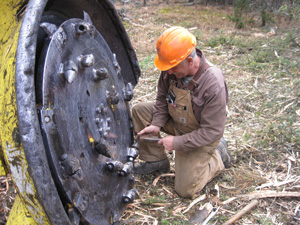|
BC CLEAR Projects 2012-2013 (funding start dates) > Quantifying Emissions Reductions by Using Mastication Treatment for Ecosystem Restoration Projects in the Rocky Mountain Trench: A Market and Non-Market Cost-Benefit Approach Quantifying Emissions Reductions by Using Mastication Treatment for Ecosystem Restoration Projects in the Rocky Mountain Trench: A Market and Non-Market Cost-Benefit Approachposted on 7:17 PM, July 6, 2016
Project Leader: Dan Murphy
Don Cook (photo left) changes a tooth on a rotary mulching head during a project that tested mastication as a means of reducing GHGs and particulate emissions. Airsheds are under increasing pressure to meet air quality standards across BC, and the Rocky Mountain Trench region is an airshed in which there are challenges meeting air quality targets. The study will contribute to air quality management by testing whether mastication (a mechanical means of small-diameter tree removal whereby the wood is chopped into a woody mulch ground cover) can reduce GHGs and particulate emissions at a lower cost than the predominant ecosystem restoration (ER) methods (mechanical and hand slashing removal of small diameter trees along with open burning). Currently, mechanical and hand slashing removal of small diameter trees along with follow-up piling (either by hand or mechanical means) and follow-up open burning are the standard ER practices used across BC. The project will estimate the emissions produced by mastication treatments versus traditional ER methods and thereby determine the net emissions reduction potential for increasing the use of mastication as a prescribed tool for ER treatments. The project team will determine the market and non-market net benefits of using mastication through a cost-benefit analysis, and the results from this project will help support best forest management practices. |
||
- About Us
- Programs & Services
- Climate Change & Air Quality
- Watersheds & Water Resources
- Sustainable and Resilient Communities
- Our Work in the Regions
- Resources
- News and Events


